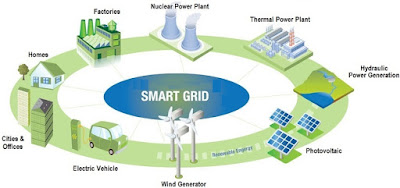What is Smart Grid?
A Smart Grid is an evolved Grid system that manages electricity demand in a sustainable, reliable and economic manner, built on advanced infrastructure and tuned to facilitate the integration of all involved. So tough definition? Let’s make it simple.
Smart Grid is a Power Grid monitored and controlled electronically to maximize efficiency and minimize outages.
This is a recent development in Electric Transmission and Distribution Sector, which enables bidirectional communication between consumer and electricity utility company. Now a day’s one of the fundamental challenges of power system operation is running a true supply-on-demand system that is expected to be absolutely reliable. Historically this challenge led to a power system based on highly controllable supply to match a largely uncontrolled demand. The use of smarter grid operations allows for greater penetration of variable energy sources through the more flexible management of the system.
Basically it is an electric power delivery system that stretches from point of generation to point of consumption. Integrated with advanced communications and information technology, all equipment and devices in a smart grid are connected by sensory elements to form a complete power network. The information is integrated and analyzed to optimize power resources, reduce costs, increase reliability, and enhance electric power efficiency.
A smart grid is an intelligent automated system for monitoring the flow of electricity and making the distribution of electricity more efficient. In a world where protecting the environment is a major concern, it is important to find cost-effective ways of reducing power usage and increasing energy independence.
Smart Grid is a combination of Energy, IT and Telecommunication Technologies.
To summarize,
- Smart Grid provides an interface between consumer appliances and the traditional assets in a power system (generation, transmission and distribution).
- It optimizes the assets of the power system.
- It supports better integration of distributed generation into the conventional centralized power system.
- It possess demand response capacity to help balance electrical consumption with supply.
Smart Grid Ecosystem:
Existing Power Supply Systems implement a Centralized Power Supply that often involves high voltages and large-scale electric power networks. With this type of power supply, failures in the electricity network can have a huge impact on the entire power supply system, and often cause widespread system shutdowns.
Because of this Smart Grid solutions is developed and implementing a Distributed Power Network instead of a centralized network is also considered. Distributed Power Networks are highly integrated and include power generation, power transmission, and power distribution, with power meters and home appliances, such as refrigerators, TV sets, washing machines, personal computers etc. also considered part of the network. A simplified Smart Grid Ecosystem is shown in figure below.
Why Smart Grid?
A Smart Grid solution provides the following benefits:
- Enhances energy usage efficiency
- Increases the proportion of distributed power generation systems and renewable energy solutions
- Enhances the flexibility of the power supply
- Reduces the overall costs of delivering power to end users
- Improves the stability and quality of the power supply
Thank you!

